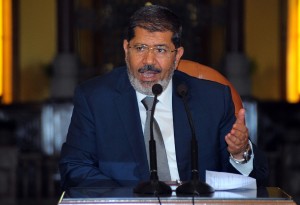
(AFP PHOTO)
The National Council for Women (NCW) sent a letter to President Mohamed Morsi and Shura Council Speaker Ahmed Fahmy on Saturday, explaining why it is not possible for it to fall under the auspices of the Shura Council.
The Salafi group Al-Gabha Al-Salafiya stirred controversy when it called upon the Shura Council to “quickly discuss a new law for the formation of the NCW which would put it under the [Shura] Council’s auspices”.
“Transforming the NCW’s subordination is legally not possible,” said Abeer Abul Ella, the head of the NCW’s media office. She added that with the letter sent to Morsi and Fahmy, the NCW attached a copy of the decision to establish the council in 2000.
The NCW stated that the council’s establishment was compatible with the international community’s desire to find a national mechanism tasked with following up with women’s issues and coordinate with other executive powers. It added that the NCW should follow the executive power representative in the presidency.
The NCW also made clear in its letter that its case is different from that of the National Council for Human Rights (NCHR). It stated that the United Nations necessitates that all human rights councils worldwide should observe the performance of the executive power, thus they cannot be under its auspices. Therefore, the NCHR is under the auspices of the Shura Council, which is a legislative body.
Al-Gabha Al-Salafiya’s calls came in a statement released on Wednesday condemning the UN Declaration on Violence against Women. The declaration was the outcome of the 57th UN Commission on the Status of Women, passed on 16 March. Al-Gabha Al-Salafiya criticised the contents of the declaration as well as the NCW members’ handling of the negotiations which led to the signing of the declaration.
“Why did the presidential representative, Pakinam Al-Sharkawi, stop at delivering the opening speech instead of staying on to attend the entire commission?” Al-Gabha Al-Salafiya questioned.
Al-Sharkawi’s taking over the opening speech was criticised by the NCW. Fatma Khafagi, NCW member who was part of the Egyptian delegation to the UN commission, stated that the NCW members considered withdrawing from the delegation upon knowing that Al-Sharkawi was going to preside over it. Nehad Abul Qomsan, director of the Egyptian Centre for Women’s Rights, said it was against protocol for Al-Sharkawi to deliver the opening speech; the speech is supposed to be delivered by the representative of the NCW.
Al-Gabha Al-Salafiya stated that it is the job of Egypt’s permanent representative in the UN to vote on the declaration, not that of the NCW representatives. It added that agreeing to this declaration goes against Egypt’s newly-enacted constitution, specifically citing Article 145 of the constitution.
Article 145 states that “the president represents the state in its foreign relations, he is tasked with setting up treaties … concerning the state’s right to sovereignty”. It is not possible to ratify an agreement which goes against the constitution.
The 57th UN Commission on the Status of Women began on 4 March and continued until 17 March.

